College+of+Engineering
-
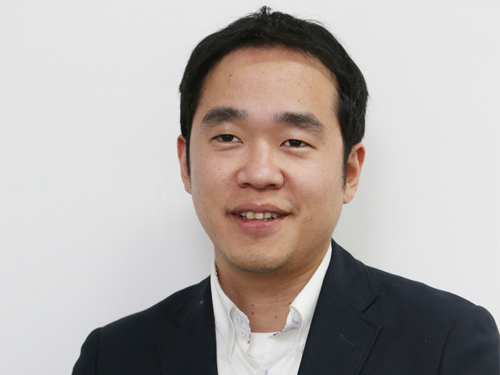 Professor Jinwoo Shin of the Electrical Engineering Department Receives the 2015 ACM SIGMETRICS Rising Star Research Award
Professor Jinwoo Shin of the Electrical Engineering Department at KAIST was selected as the recipient of the 2015 ACM SIGMETRICS Rising Star Research Award.
As a computer systems performance evaluation community, SIGMETRICS annually awards a junior researcher. He was selected as the 8th annual recipient, being the first from an Asian university.
Professor Shin was recognized for his work in theoretical analysis of stochastic queueing networks and machine learning. He said, “I would like to contribute to the expansion of computing and network theory in Korea wherein those fields are unrecognized.”
He has received numerous awards including Kennneth C. Sevcik (Best Student Paper) Award at SIGMETRICS 2009, George M. Sprowls (Best MIT CS PhD Thesis) Award 2010, Best Paper Award at MOBIHOC 2013, Best Publication Award from INFORMS Applied Probability Society 2013, and Bloomberg Scientific Research Award 2015.
2015.06.21 View 10890
Professor Jinwoo Shin of the Electrical Engineering Department Receives the 2015 ACM SIGMETRICS Rising Star Research Award
Professor Jinwoo Shin of the Electrical Engineering Department at KAIST was selected as the recipient of the 2015 ACM SIGMETRICS Rising Star Research Award.
As a computer systems performance evaluation community, SIGMETRICS annually awards a junior researcher. He was selected as the 8th annual recipient, being the first from an Asian university.
Professor Shin was recognized for his work in theoretical analysis of stochastic queueing networks and machine learning. He said, “I would like to contribute to the expansion of computing and network theory in Korea wherein those fields are unrecognized.”
He has received numerous awards including Kennneth C. Sevcik (Best Student Paper) Award at SIGMETRICS 2009, George M. Sprowls (Best MIT CS PhD Thesis) Award 2010, Best Paper Award at MOBIHOC 2013, Best Publication Award from INFORMS Applied Probability Society 2013, and Bloomberg Scientific Research Award 2015.
2015.06.21 View 10890 -
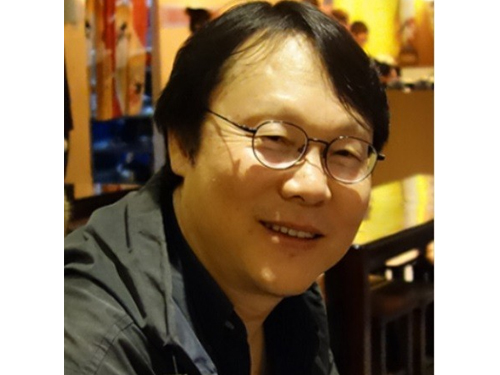 Professor Jeong-Guon Ih Is Appointed the Vice President of the International Commission for Acoustics
Professor Jeong-Guon Ih of the Mechanical Engineering Department at KAIST has been elected to serve as the Vice President of the International Commission for Acoustics (ICA) from June 2015 to the end of 2016. The appointment was made at the meeting of the ICA Board held on June 1, 2015, in Maastricht, the Netherlands.
Professor Ih currently also chairs the Asia-Pacific Acoustics Commission.
Instituted in 1951, the ICA is an academic society that promotes international development and collaboration in all fields of acoustics including research, advancement, education, and standardization. It has a membership of 44 national acoustical societies worldwide and four observer countries.
2015.06.17 View 8086
Professor Jeong-Guon Ih Is Appointed the Vice President of the International Commission for Acoustics
Professor Jeong-Guon Ih of the Mechanical Engineering Department at KAIST has been elected to serve as the Vice President of the International Commission for Acoustics (ICA) from June 2015 to the end of 2016. The appointment was made at the meeting of the ICA Board held on June 1, 2015, in Maastricht, the Netherlands.
Professor Ih currently also chairs the Asia-Pacific Acoustics Commission.
Instituted in 1951, the ICA is an academic society that promotes international development and collaboration in all fields of acoustics including research, advancement, education, and standardization. It has a membership of 44 national acoustical societies worldwide and four observer countries.
2015.06.17 View 8086 -
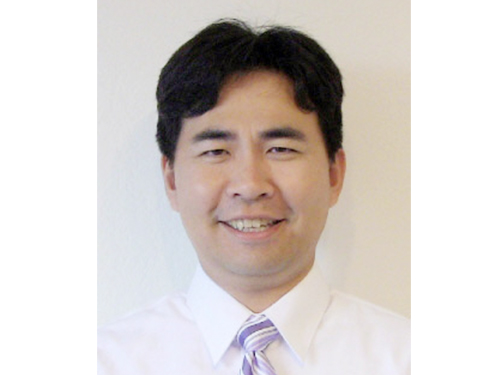 Professor Sung Yong Kim Presents a Keynote Speech at the International Ocean Color Science Meeting (IOCS) 2015
Professor Sung Yong Kim of the Mechanical Engineering Department at KAIST delivered a keynote speech at the International Ocean Color Science Meeting (IOCS) 2015 held in San Francisco on June 15-18, 2015. His speech was entitled “Research and Applications Using Sub-mesoscale GOCI (Geostationary Ocean Color Imager) Data.”
The IOCS, organized by the International Ocean Color Coordinating Group (IOCCG), is a community consultation meeting providing communication and collaboration between space agencies and the ocean color community, building strong ties among international representatives of the ocean color communities, and providing a forum for discussion and the evolution of community thinking on a range of issues.
Professor Kim was recognized for his contribution towards the development of remote exploration of sub-mesoscale processes including eddies, fronts, and environmental fluid dynamics.
He also attended the 26th General Assembly of the International Union of Geodesy and Geophysics (IUGG) in Prague, the Czech Republic, on June 22, 2015 and gave a presentation on the sub-mesoscale eddies circulation research.
2015.06.12 View 10947
Professor Sung Yong Kim Presents a Keynote Speech at the International Ocean Color Science Meeting (IOCS) 2015
Professor Sung Yong Kim of the Mechanical Engineering Department at KAIST delivered a keynote speech at the International Ocean Color Science Meeting (IOCS) 2015 held in San Francisco on June 15-18, 2015. His speech was entitled “Research and Applications Using Sub-mesoscale GOCI (Geostationary Ocean Color Imager) Data.”
The IOCS, organized by the International Ocean Color Coordinating Group (IOCCG), is a community consultation meeting providing communication and collaboration between space agencies and the ocean color community, building strong ties among international representatives of the ocean color communities, and providing a forum for discussion and the evolution of community thinking on a range of issues.
Professor Kim was recognized for his contribution towards the development of remote exploration of sub-mesoscale processes including eddies, fronts, and environmental fluid dynamics.
He also attended the 26th General Assembly of the International Union of Geodesy and Geophysics (IUGG) in Prague, the Czech Republic, on June 22, 2015 and gave a presentation on the sub-mesoscale eddies circulation research.
2015.06.12 View 10947 -
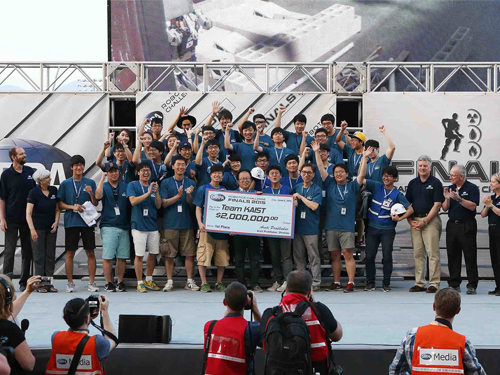 KAIST's DRC-HUBO Wins the DARPA Robotics Challenge 2015
DRC-HUBO finished all eight assignments in less than 45 minutes, taking first place among 24 international teams and claiming the USD 2 million prize offered by a US defense research agency.
The Robotics Challenge Finals 2015 hosted by the US Defense Advanced Research Projects Agency (DARPA) took place on June 5-6, 2015 at the Fairplex in Pomona, California.
Team KAIST of the Republic of Korea led by Professor Jun-Ho Oh of the Mechanical Engineering Department at the Korea Advanced Institute of Science and Technology (KAIST), Professor In-So Kweon of the Electrical Engineering Department, and researchers from Rainbow Co., the university’s spin-off company that builds the robots, won the DARPA Finals. The team received USD 2 million as a prize.
The DARPA’s Robotics Challenge (DRC) promotes a competition of robot systems and software teams which seek to develop robots capable of assisting humans in responding to natural and man-made disasters such as the Fukushima Daiichi nuclear incident in 2011. The DRC consists of three competitions: a software-based Virtual Robotics Challenge which took place in June 2013; the Robotics Challenge Trials in Homestead, Florida, in December 2013; and the Finals in June 2015.
A total of 24 teams from universities and private and public research institutes from Korea, the US, Hong Kong, Germany, Japan, and Italy participated in the Finals. The participating teams had to finish eight assignments in 60 minutes, during which their robots were untethered and operated wirelessly without communication from their engineers.
Each team was assigned a series of tasks: they included driving a vehicle, getting out of a vehicle, opening a door, turning a valve, drilling a hole in a wall, a surprise task such as pushing a button or turning on a switch, walking over rubble or debris, and climbing stairs. Robots scored a point each time they completed their missions. To win, a team had to complete all the tasks successfully in the shortest amount of time possible.
Team KAIST completed the entire course in 44 minutes and 28 seconds, followed by the Institute of Human and Machine Cognition (IHMC) Robotics in Pensacola, Florida in 50:26, and Team TARTAN Rescue of the National Robotics Engineering Center at Carnegie Mellon University in 55:15.
For details, see an article below from the New York Times:
New York Times, June 6, 2015
“Korean Robot Makers Walk Off With $2 Million Prize”
http://www.nytimes.com/2015/06/07/science/korean-robot-makers-walk-off-with-2-million-prize.html?_r=1
DRC-HUBO sticks a plug into an outlet for the surprise task at the 2015 DARPA Robotics Challenge on June 5-6, 2015, in Pomona, California.
DRC-HUBO turns a valve in a clockwise direction.
DRC-HUBO drills to cut a circle into the wall.
Members of Team KAIST pose together after the award ceremony on June 6, 2015.
2015.06.07 View 25660
KAIST's DRC-HUBO Wins the DARPA Robotics Challenge 2015
DRC-HUBO finished all eight assignments in less than 45 minutes, taking first place among 24 international teams and claiming the USD 2 million prize offered by a US defense research agency.
The Robotics Challenge Finals 2015 hosted by the US Defense Advanced Research Projects Agency (DARPA) took place on June 5-6, 2015 at the Fairplex in Pomona, California.
Team KAIST of the Republic of Korea led by Professor Jun-Ho Oh of the Mechanical Engineering Department at the Korea Advanced Institute of Science and Technology (KAIST), Professor In-So Kweon of the Electrical Engineering Department, and researchers from Rainbow Co., the university’s spin-off company that builds the robots, won the DARPA Finals. The team received USD 2 million as a prize.
The DARPA’s Robotics Challenge (DRC) promotes a competition of robot systems and software teams which seek to develop robots capable of assisting humans in responding to natural and man-made disasters such as the Fukushima Daiichi nuclear incident in 2011. The DRC consists of three competitions: a software-based Virtual Robotics Challenge which took place in June 2013; the Robotics Challenge Trials in Homestead, Florida, in December 2013; and the Finals in June 2015.
A total of 24 teams from universities and private and public research institutes from Korea, the US, Hong Kong, Germany, Japan, and Italy participated in the Finals. The participating teams had to finish eight assignments in 60 minutes, during which their robots were untethered and operated wirelessly without communication from their engineers.
Each team was assigned a series of tasks: they included driving a vehicle, getting out of a vehicle, opening a door, turning a valve, drilling a hole in a wall, a surprise task such as pushing a button or turning on a switch, walking over rubble or debris, and climbing stairs. Robots scored a point each time they completed their missions. To win, a team had to complete all the tasks successfully in the shortest amount of time possible.
Team KAIST completed the entire course in 44 minutes and 28 seconds, followed by the Institute of Human and Machine Cognition (IHMC) Robotics in Pensacola, Florida in 50:26, and Team TARTAN Rescue of the National Robotics Engineering Center at Carnegie Mellon University in 55:15.
For details, see an article below from the New York Times:
New York Times, June 6, 2015
“Korean Robot Makers Walk Off With $2 Million Prize”
http://www.nytimes.com/2015/06/07/science/korean-robot-makers-walk-off-with-2-million-prize.html?_r=1
DRC-HUBO sticks a plug into an outlet for the surprise task at the 2015 DARPA Robotics Challenge on June 5-6, 2015, in Pomona, California.
DRC-HUBO turns a valve in a clockwise direction.
DRC-HUBO drills to cut a circle into the wall.
Members of Team KAIST pose together after the award ceremony on June 6, 2015.
2015.06.07 View 25660 -
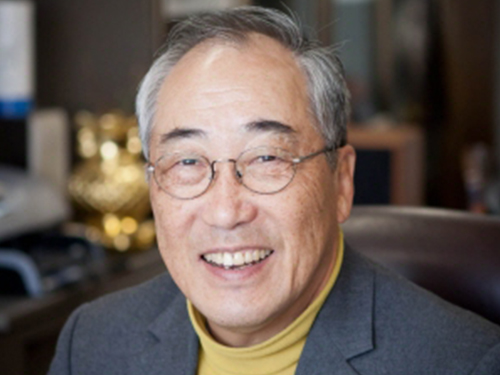 The Acoustical Society of America Names Yang Hann Kim of KAIST the Recipient of the 2015 Rossing Prize in Acoustics Education
The award, given to Dr. Kim in recognition of his contributions to the advancement of acoustics education, will be presented during the 170th Meeting of the Acoustical Society of America on November 2-6, 2015 in Jacksonville, Florida.
The Acoustical Society of America (ASA) announced today that Professor Yang Hann Kim of the Mechanical Engineering Department at the Korea Advanced Institute of Science and Technology (KAIST) was the 12th recipient of the Rossing Prize in Acoustics Education. Dr. Kim is the first recipient selected from a non-English-speaking nation.
The Rossing Prize in Acoustics Education was established in 2003 from a generous gift made to the ASA Foundation by Thomas D. Rossing to recognize an individual who has made significant contributions to the advancement of acoustics education through distinguished teaching, creation of educational materials, textbook writing, and other activities.
During 25 years of teaching and conducting research in acoustics, noise, and vibration at KAIST, Dr. Kim has advised 26 doctorates and published over 200 research papers in journals such as Journal of Acoustical Society of America, Journal of Sound and Vibration, and Journal of Mechanical Systems and Signal Processing. He also wrote two acoustics textbooks for university education, which has been widely read worldwide. The textbook titles are: Sound Propagation: An Impedance Based Approach (Wiley, July 2010) and with the co-author, Dr. Jung-Woo Choi, Sound Visualization and Manipulation (Wiley, September 2013).
Since 2009, Professor Kim has lectured an online course entitled “Introduction to Acoustics,” offering students and the general public throughout the world guidance to study acoustics through the basic concept of impedance, for example, on vibrations and waves.
Dr. Kim will receive the award during ASA’s 170th conference to be held on November 2-6, 2015 at the Hyatt Regency Jacksonville Riverfront Hotel in Jacksonville, Florida, USA.
For the list of previous recipients of the Rossing Prize in Acoustics Education,
see:http://acousticalsociety.org/funding_resources/prizes#rossing
2015.06.04 View 10644
The Acoustical Society of America Names Yang Hann Kim of KAIST the Recipient of the 2015 Rossing Prize in Acoustics Education
The award, given to Dr. Kim in recognition of his contributions to the advancement of acoustics education, will be presented during the 170th Meeting of the Acoustical Society of America on November 2-6, 2015 in Jacksonville, Florida.
The Acoustical Society of America (ASA) announced today that Professor Yang Hann Kim of the Mechanical Engineering Department at the Korea Advanced Institute of Science and Technology (KAIST) was the 12th recipient of the Rossing Prize in Acoustics Education. Dr. Kim is the first recipient selected from a non-English-speaking nation.
The Rossing Prize in Acoustics Education was established in 2003 from a generous gift made to the ASA Foundation by Thomas D. Rossing to recognize an individual who has made significant contributions to the advancement of acoustics education through distinguished teaching, creation of educational materials, textbook writing, and other activities.
During 25 years of teaching and conducting research in acoustics, noise, and vibration at KAIST, Dr. Kim has advised 26 doctorates and published over 200 research papers in journals such as Journal of Acoustical Society of America, Journal of Sound and Vibration, and Journal of Mechanical Systems and Signal Processing. He also wrote two acoustics textbooks for university education, which has been widely read worldwide. The textbook titles are: Sound Propagation: An Impedance Based Approach (Wiley, July 2010) and with the co-author, Dr. Jung-Woo Choi, Sound Visualization and Manipulation (Wiley, September 2013).
Since 2009, Professor Kim has lectured an online course entitled “Introduction to Acoustics,” offering students and the general public throughout the world guidance to study acoustics through the basic concept of impedance, for example, on vibrations and waves.
Dr. Kim will receive the award during ASA’s 170th conference to be held on November 2-6, 2015 at the Hyatt Regency Jacksonville Riverfront Hotel in Jacksonville, Florida, USA.
For the list of previous recipients of the Rossing Prize in Acoustics Education,
see:http://acousticalsociety.org/funding_resources/prizes#rossing
2015.06.04 View 10644 -
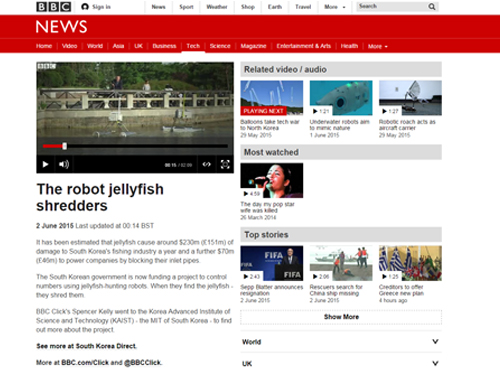 BBC Feautres KAIST's Jellyfish Robot
Click, a weekly BBC television program covering news and recent developments in science and technology, introduced KAIST’s robotics project, JEROS, which has been conducted by Professor Hyun Myung of the Urban Robotics Lab (http://urobot.kaist.ac.kr/). JEROS is a robotics system that detects, captures, and removes jellyfish in the ocean. For the show, please click the link below:
BBC News, Click, June 2, 2015
The Robot Jellyfish Shredders
http://www.bbc.com/news/technology-32965841
2015.06.03 View 10339
BBC Feautres KAIST's Jellyfish Robot
Click, a weekly BBC television program covering news and recent developments in science and technology, introduced KAIST’s robotics project, JEROS, which has been conducted by Professor Hyun Myung of the Urban Robotics Lab (http://urobot.kaist.ac.kr/). JEROS is a robotics system that detects, captures, and removes jellyfish in the ocean. For the show, please click the link below:
BBC News, Click, June 2, 2015
The Robot Jellyfish Shredders
http://www.bbc.com/news/technology-32965841
2015.06.03 View 10339 -
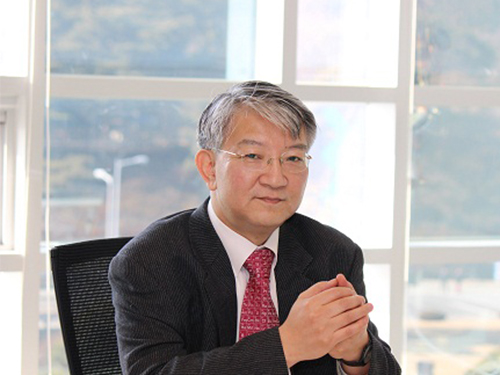 Professor Sang-Yup Lee Receives the Order of Service Merit Red Stripes from the Korean Government
The government of the Republic of Korea named Professor Sang-Yup Lee of the Department of Chemical and Bio-molecular Engineering at KAIST as the fiftieth recipient of the Order of Service Merit Red Stripes on May 19, 2015.
This medal is awarded to government employees, officials, and teachers in recognition of their contributions to public services including education.
Professor Lee is regarded as a leading scientist in the field of metabolic engineering, genomics, proteomics, metabolomics, and bioinformatics on microorganism producing various primary and secondary metabolites. He contributed significantly to the advancement of bio-based engineering research in Korea.
In addition, his research in microorganism metabolic engineering propelled him to the front of his field, making him the world’s founder of systems metabolic engineering, inventing numerous technologies in strain development.
Professor Lee has received many patent rights in bioprocess engineering. While at KAIST, he applied for 585 patents and registered 227 patents. In particular, he has applied for 135 patents and registered 99 patents in the past five years, successfully turning research results into commercial applications.
Professor Lee said, “I’m glad to contribute to the development of Korean science and technology as a researcher and teacher. I would like to share this honor with my students, master’s and doctoral students in particular, because without their support, it wouldn’t have been possible to pull off the highest level of research results recognized by this medal.”
2015.05.21 View 9785
Professor Sang-Yup Lee Receives the Order of Service Merit Red Stripes from the Korean Government
The government of the Republic of Korea named Professor Sang-Yup Lee of the Department of Chemical and Bio-molecular Engineering at KAIST as the fiftieth recipient of the Order of Service Merit Red Stripes on May 19, 2015.
This medal is awarded to government employees, officials, and teachers in recognition of their contributions to public services including education.
Professor Lee is regarded as a leading scientist in the field of metabolic engineering, genomics, proteomics, metabolomics, and bioinformatics on microorganism producing various primary and secondary metabolites. He contributed significantly to the advancement of bio-based engineering research in Korea.
In addition, his research in microorganism metabolic engineering propelled him to the front of his field, making him the world’s founder of systems metabolic engineering, inventing numerous technologies in strain development.
Professor Lee has received many patent rights in bioprocess engineering. While at KAIST, he applied for 585 patents and registered 227 patents. In particular, he has applied for 135 patents and registered 99 patents in the past five years, successfully turning research results into commercial applications.
Professor Lee said, “I’m glad to contribute to the development of Korean science and technology as a researcher and teacher. I would like to share this honor with my students, master’s and doctoral students in particular, because without their support, it wouldn’t have been possible to pull off the highest level of research results recognized by this medal.”
2015.05.21 View 9785 -
 KAIST Holds a Ceremony to Present the Cho Jeong-Hoon Academic Award
Doctor Gyu-Tae Kim from General Electric (GE) received the eleventh Cho Jeong-Hoon Academic Award. The award ceremony took place in the main conference room of the administration building on campus on May 13, 2015.
Dr. Kim, a graduate of KAIST, conducts research in the field of instable swirl combustion of gas turbines and has contributed to the development of aircraft engines. He earned his name as a researcher by identifying, for the first time in the world, the correlation between the thermoacoustic instability of gas turbine engines and the complex response of swirl flames.
Along with Dr. Kim, Shin-Jae Kang of the Aerospace Engineering Department, KAIST, Yong-Gyun Bae of the Mechanical Engineering Department, Korea University, and Ji-Won Kim from Kongju National University High School, received the Cho Jeong-Hoon scholarship.
The award was created in commemoration of Cho Jeong-Hoon who was killed in an explosion during his research at the KAIST Rocket Laboratory on May 13, 2003. Cho’s parents donated USD 450,000 to KAIST in his memory. Since 2005, a total of four students from KAIST, Korea University, and Kongju National University High School, all of which the late Honorary Doctor Cho attended, have received the scholarship.
2015.05.19 View 9107
KAIST Holds a Ceremony to Present the Cho Jeong-Hoon Academic Award
Doctor Gyu-Tae Kim from General Electric (GE) received the eleventh Cho Jeong-Hoon Academic Award. The award ceremony took place in the main conference room of the administration building on campus on May 13, 2015.
Dr. Kim, a graduate of KAIST, conducts research in the field of instable swirl combustion of gas turbines and has contributed to the development of aircraft engines. He earned his name as a researcher by identifying, for the first time in the world, the correlation between the thermoacoustic instability of gas turbine engines and the complex response of swirl flames.
Along with Dr. Kim, Shin-Jae Kang of the Aerospace Engineering Department, KAIST, Yong-Gyun Bae of the Mechanical Engineering Department, Korea University, and Ji-Won Kim from Kongju National University High School, received the Cho Jeong-Hoon scholarship.
The award was created in commemoration of Cho Jeong-Hoon who was killed in an explosion during his research at the KAIST Rocket Laboratory on May 13, 2003. Cho’s parents donated USD 450,000 to KAIST in his memory. Since 2005, a total of four students from KAIST, Korea University, and Kongju National University High School, all of which the late Honorary Doctor Cho attended, have received the scholarship.
2015.05.19 View 9107 -
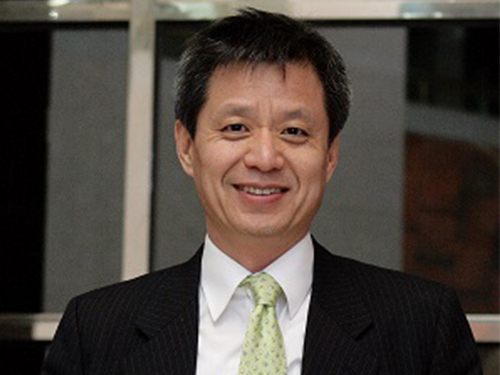 Professor Duck-Joo Lee Is Elected Vice Chairman of the American Helicopter Society
Professor Duck-Joo Lee of the Department of Aerospace Engineering at KAIST was elected to become the first Korean vice president of the American Helicopter Society (AHS). He will serve a two-year term, starting this July, and his responsibilities will cover Asia, Australia, and Russia.
AHS, established in 1943, is the biggest association in the field with 6,800 members. The society is intended to advance helicopter technology and vertical take-off and landing (VTOL) in airplane technology.
The AHS’s board of directors consists of thirty experts in rotorcrafts, including the president of Sikorsky Aircraft Corporation, a renowned American helicopter manufacturing company.
Professor Lee started his career as a researcher in NASA Ames Research Center in the United States, and is now an acknowledged scholar in the field of aircraft jet engines and helicopter Aero-Acoustics. He also worked as the Assistant Editor-in-Chief of Journal of the American Helicopter Society, the President of the first Asia-Australia Rotorcraft Forum, and the leader of National Task Force Team of Korean Military and Civil Helicopter.
2015.05.18 View 9405
Professor Duck-Joo Lee Is Elected Vice Chairman of the American Helicopter Society
Professor Duck-Joo Lee of the Department of Aerospace Engineering at KAIST was elected to become the first Korean vice president of the American Helicopter Society (AHS). He will serve a two-year term, starting this July, and his responsibilities will cover Asia, Australia, and Russia.
AHS, established in 1943, is the biggest association in the field with 6,800 members. The society is intended to advance helicopter technology and vertical take-off and landing (VTOL) in airplane technology.
The AHS’s board of directors consists of thirty experts in rotorcrafts, including the president of Sikorsky Aircraft Corporation, a renowned American helicopter manufacturing company.
Professor Lee started his career as a researcher in NASA Ames Research Center in the United States, and is now an acknowledged scholar in the field of aircraft jet engines and helicopter Aero-Acoustics. He also worked as the Assistant Editor-in-Chief of Journal of the American Helicopter Society, the President of the first Asia-Australia Rotorcraft Forum, and the leader of National Task Force Team of Korean Military and Civil Helicopter.
2015.05.18 View 9405 -
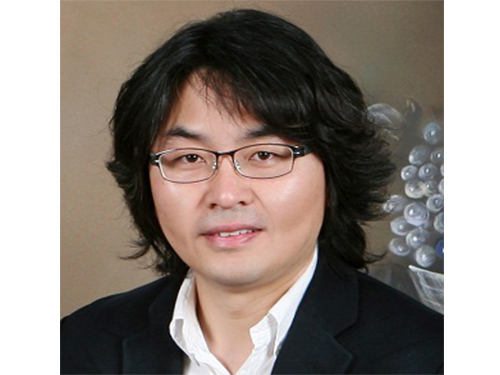 KAIST's Patina Engraving System Awarded at ACM CHI
Professor Tek-Jin Nam’s research team of the Industrial Design Department of KAIST received the Best Paper Award in the 2015 Association for Computing Machinery’s (ACM) Conference on Human Factors in Computing Systems (CHI) which was held from April 18 to 23, 2015. The team consisted of two KAIST students: Moon-Hwan Lee, a Ph.D. candidate, and Sejin Cha, a master's student. The team was the first in Asia to receive the award.
The ACM CHI represents the premier conference in the field of Human-Computer Interaction (HCI). This year’s event, held in Seoul, South Korea, was the first conference that the ACM had held in Asia in its thirty-three year history. The KAIST team’s paper, entitled “Patina Engraver: Visualizing Activity Logs as Patina in Fashionable Trackers,” ranked in the top 1% of 2,000 submitted papers.
The team developed Patina Engraver, an activity tracker, which monitors and tracks fitness-related metrics such as distances walked or run, calorie consumption, heartbeat, sleep quality, and blood pressure. The device wirelessly connects to a computer or smartphone so that it can store and utilize long-term tracking data.
However, what makes Patina Engraver, a smart wristband, different from other health trackers is its ability to display different design patterns based on users’ activity on the surface of the wristband. The research team was inspired to build this system from the fact that wearable electronics including activity trackers can be used not only as health care devices, but also as fashion items to express emotions and personalities.
Equipped with an engraving feature, the charging pad or holder for Patina Engraver draws individualized patterns to reflect the user’s activities, such as walking or running, while the device is being charged. The pattern display syncs with the frequency of usage, therefore, the more the tracker is used, the greater the number of patterns will show up.
According to the team, since Patina Engraver provides users with a personalized illustration of their activity on the tracker, users are more motivated to put on the tracker and exercise.
Professor Nam said, “This research can be applied in producing other wearable devices to enhance users’ emotional satisfaction. When wearable technology is combined with design and emotion, the industry market will quickly expand.”
Figure 1: Patina engraving system developed by KAIST research team
Figure 2: The process of engraving illustrations of the activity records onto the tracker
Figure 3: Personalized activity trackers based on activity records
2015.05.15 View 15514
KAIST's Patina Engraving System Awarded at ACM CHI
Professor Tek-Jin Nam’s research team of the Industrial Design Department of KAIST received the Best Paper Award in the 2015 Association for Computing Machinery’s (ACM) Conference on Human Factors in Computing Systems (CHI) which was held from April 18 to 23, 2015. The team consisted of two KAIST students: Moon-Hwan Lee, a Ph.D. candidate, and Sejin Cha, a master's student. The team was the first in Asia to receive the award.
The ACM CHI represents the premier conference in the field of Human-Computer Interaction (HCI). This year’s event, held in Seoul, South Korea, was the first conference that the ACM had held in Asia in its thirty-three year history. The KAIST team’s paper, entitled “Patina Engraver: Visualizing Activity Logs as Patina in Fashionable Trackers,” ranked in the top 1% of 2,000 submitted papers.
The team developed Patina Engraver, an activity tracker, which monitors and tracks fitness-related metrics such as distances walked or run, calorie consumption, heartbeat, sleep quality, and blood pressure. The device wirelessly connects to a computer or smartphone so that it can store and utilize long-term tracking data.
However, what makes Patina Engraver, a smart wristband, different from other health trackers is its ability to display different design patterns based on users’ activity on the surface of the wristband. The research team was inspired to build this system from the fact that wearable electronics including activity trackers can be used not only as health care devices, but also as fashion items to express emotions and personalities.
Equipped with an engraving feature, the charging pad or holder for Patina Engraver draws individualized patterns to reflect the user’s activities, such as walking or running, while the device is being charged. The pattern display syncs with the frequency of usage, therefore, the more the tracker is used, the greater the number of patterns will show up.
According to the team, since Patina Engraver provides users with a personalized illustration of their activity on the tracker, users are more motivated to put on the tracker and exercise.
Professor Nam said, “This research can be applied in producing other wearable devices to enhance users’ emotional satisfaction. When wearable technology is combined with design and emotion, the industry market will quickly expand.”
Figure 1: Patina engraving system developed by KAIST research team
Figure 2: The process of engraving illustrations of the activity records onto the tracker
Figure 3: Personalized activity trackers based on activity records
2015.05.15 View 15514 -
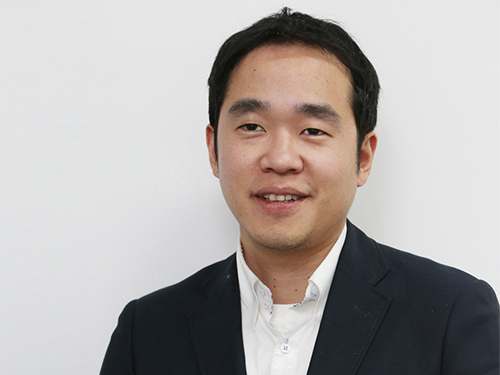 Professor Jinwoo Shin Receives the Bloomberg Scientific Research Award
Professor Jinwoo Shin (https://sites.google.com/site/mijirim/) of the Electrical Engineering Department at KAIST has been selected as one of the three winners to receive the first Bloomberg Scientific Research Award this month. The newly created award is presented to researchers in computer science who conduct high-quality research in such areas as machine learning, natural language processing, machine translation, statistics, and theory.
Professor Shin submitted his research proposal entitled “Scalable Probabilistic Deep Leaning,” and the award will support funding his research for one year. For details, please click on the link below for an article released by Bloomberg News, announcing the winners of the award:
Bloomberg News, April 28, 2015
“Announcing the Winners of the Bloomberg’s First Scientific Research Program”
https://3blmedia.com/News/Announcing-Winners-Bloombergs-First-Scientific-Research-Program
2015.04.30 View 9247
Professor Jinwoo Shin Receives the Bloomberg Scientific Research Award
Professor Jinwoo Shin (https://sites.google.com/site/mijirim/) of the Electrical Engineering Department at KAIST has been selected as one of the three winners to receive the first Bloomberg Scientific Research Award this month. The newly created award is presented to researchers in computer science who conduct high-quality research in such areas as machine learning, natural language processing, machine translation, statistics, and theory.
Professor Shin submitted his research proposal entitled “Scalable Probabilistic Deep Leaning,” and the award will support funding his research for one year. For details, please click on the link below for an article released by Bloomberg News, announcing the winners of the award:
Bloomberg News, April 28, 2015
“Announcing the Winners of the Bloomberg’s First Scientific Research Program”
https://3blmedia.com/News/Announcing-Winners-Bloombergs-First-Scientific-Research-Program
2015.04.30 View 9247 -
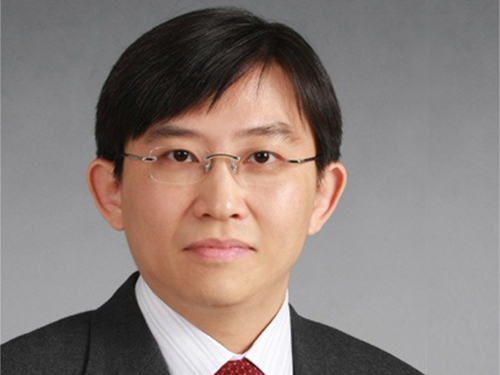 Professor Sang Ouk Kim Receives the POSCO Academic Award
Professor Sang Ouk Kim of KAIST’s Department of Materials Science and Engineering received the 2015 POSCO Academic Award. The award ceremony took place at the annual conference of the Korean Institute of Metals and Materials on April 23, 2015.
The POSCO Academic Award has been presented to the Institute's researchers and academics in recognition of their contributions to the advancement of metals and materials engineering in Korea.
Professor Kim is known for his pioneering work in manipulating the properties (work function, conductivity, surface energy, chemo-responsiveness, etc.) of carbon-based materials using double-element doping. Through his research, Professor Kim showed that carbon materials could be extremely useful in various areas including solar batteries and flexible devices. His work has been recognized and published in such journals as Advanced Materials, which invited him to write a review paper on his research in its 25th anniversary issue in 2014, along with world-renowned scholars including the Nobel laureate Alan Heeger.
Professor Kim has published a total of 143 Science Citation Index papers in journals like Nature, Science, Nature Materials, Nature Communications, Advanced Materials, Nano Letters, and Physical Review Letters. According to Scopus, a bibliographic database containing abstracts and citations for academic journal articles, he has been cited 6,456 times and has the h-index of 44, an index describing the scientific productivity and impact of a researcher.
2015.04.22 View 11242
Professor Sang Ouk Kim Receives the POSCO Academic Award
Professor Sang Ouk Kim of KAIST’s Department of Materials Science and Engineering received the 2015 POSCO Academic Award. The award ceremony took place at the annual conference of the Korean Institute of Metals and Materials on April 23, 2015.
The POSCO Academic Award has been presented to the Institute's researchers and academics in recognition of their contributions to the advancement of metals and materials engineering in Korea.
Professor Kim is known for his pioneering work in manipulating the properties (work function, conductivity, surface energy, chemo-responsiveness, etc.) of carbon-based materials using double-element doping. Through his research, Professor Kim showed that carbon materials could be extremely useful in various areas including solar batteries and flexible devices. His work has been recognized and published in such journals as Advanced Materials, which invited him to write a review paper on his research in its 25th anniversary issue in 2014, along with world-renowned scholars including the Nobel laureate Alan Heeger.
Professor Kim has published a total of 143 Science Citation Index papers in journals like Nature, Science, Nature Materials, Nature Communications, Advanced Materials, Nano Letters, and Physical Review Letters. According to Scopus, a bibliographic database containing abstracts and citations for academic journal articles, he has been cited 6,456 times and has the h-index of 44, an index describing the scientific productivity and impact of a researcher.
2015.04.22 View 11242